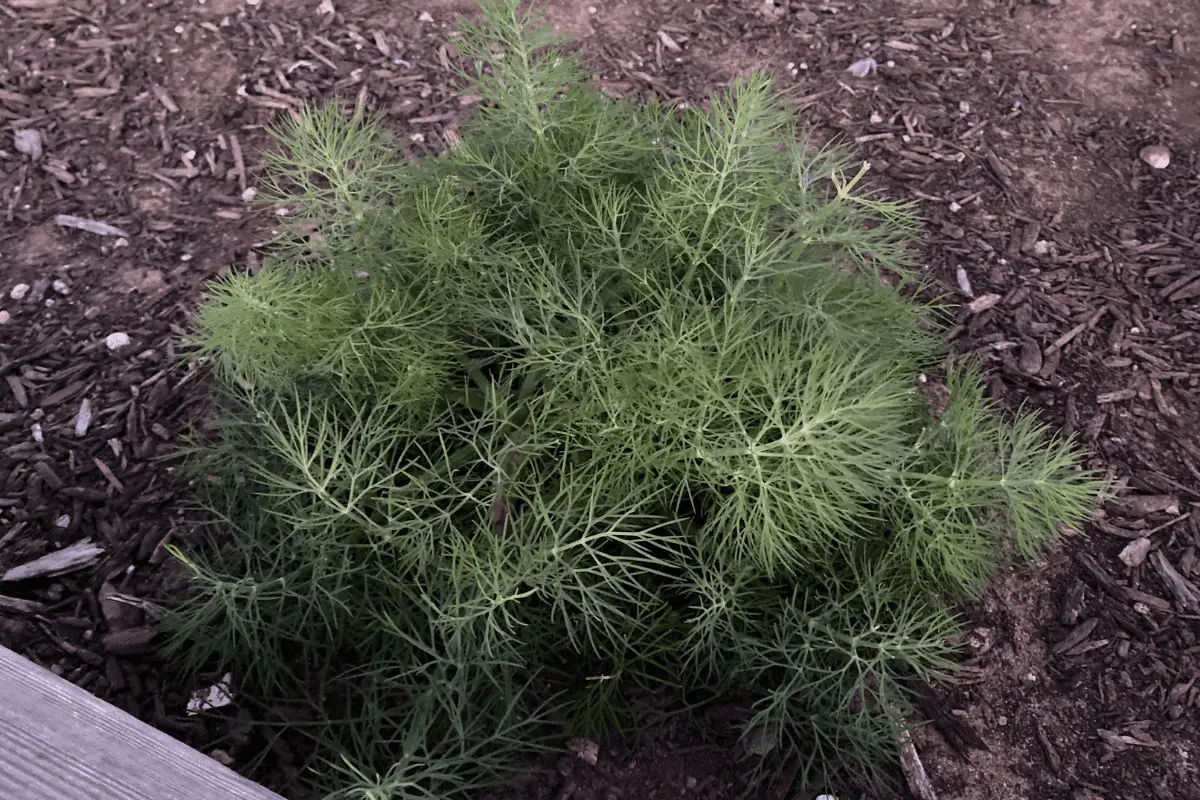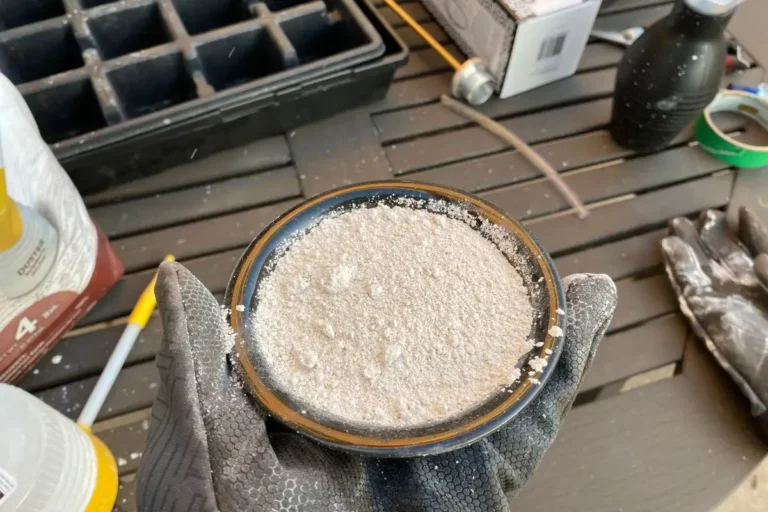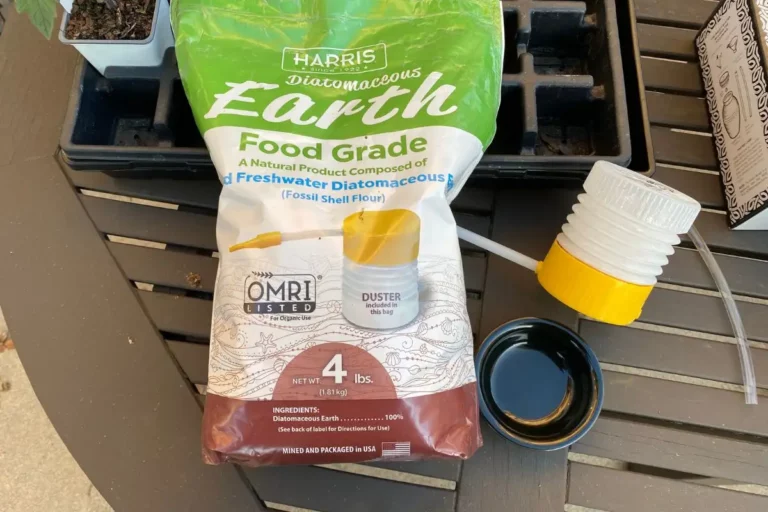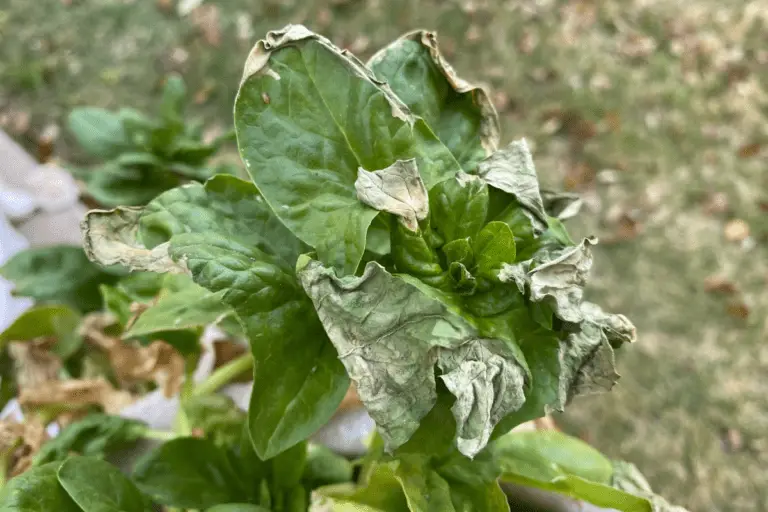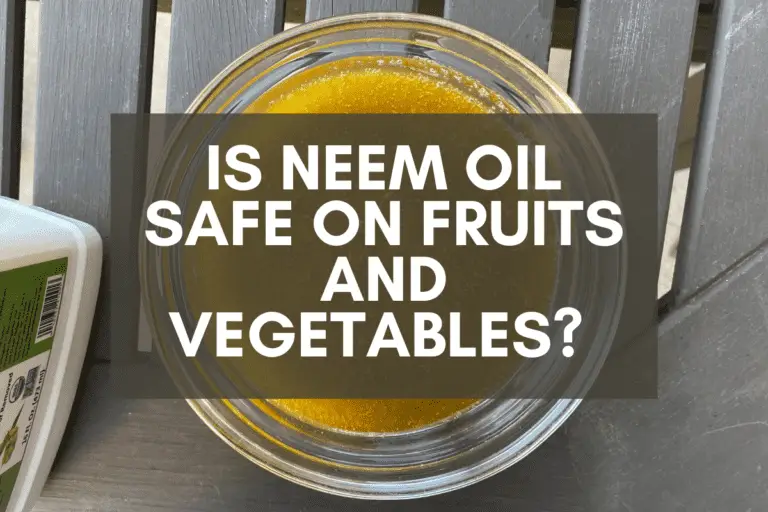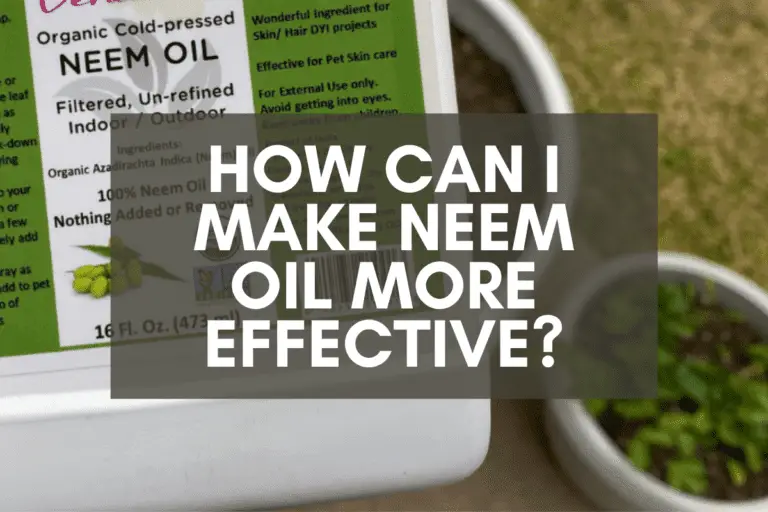Will Neem Oil Kill Herbs? Consider This Before Spraying
Last year, I set aside one of my raised garden beds for herbs, but I decided to intermix radishes, kale, lettuce, and spinach to make the most of the space. Everything was taking off, but out of nowhere, aphids and spider mites showed up and started proliferating.
Whenever that happens, I normally pull out the neem oil and start spraying, but the intermixed plants got me thinking: Can I spray herbs with neem oil? If I do, will it kill or damage them?
Neem oil can be used on herbs, but generally speaking, insecticidal soap is a safer option. This is especially true of herbs that are delicate, wispy, or fuzzy (like basil, cilantro, dill, parsley, and sage). If applied too liberally or in too-high concentrations, neem oil can damage herbs.
I’ve seen firsthand how easy it is to burn plants with neem oil, having accidentally burned several plants last year on an unexpectedly hot day.
My goal with this article is simple: I want to help you avoid the mistakes I’ve made so that you grow abundant herbs and use your neem oil as effectively as possible.
You’ll need some supplies. In fact, I own 3 garden sprayers: a 1-gallon and 2-gallon sprayer that I primarily use for insecticidal soap sprays and a roughly 1/2 gallon sprayer for neem oil.
Unlike insecticidal soap sprays, you can’t store neem oil once you’ve diluted it in water since the chemical compounds begin breaking down quickly. If you use a smaller sprayer for your neem oil, you can ensure that you make only as much as you need to get the job done.
Now that we’ve covered the supplies you’ll need, let’s take a look at several things you’ll want to keep in mind when it comes to spraying neem oil on herbs.
Can You Use Neem Oil on Herbs? 4 Things to Consider
When it comes to using neem oil on herbs, there are several reasons why I generally advise people not to do so.
Here are the main ones:
1. Herbs Are Unattractive to Many Destructive Bugs
Herbs won’t necessarily repel garden pests, unlike several members of the Allium family (garlic, onions, etc.). But herbs also don’t attract all that many pests either.
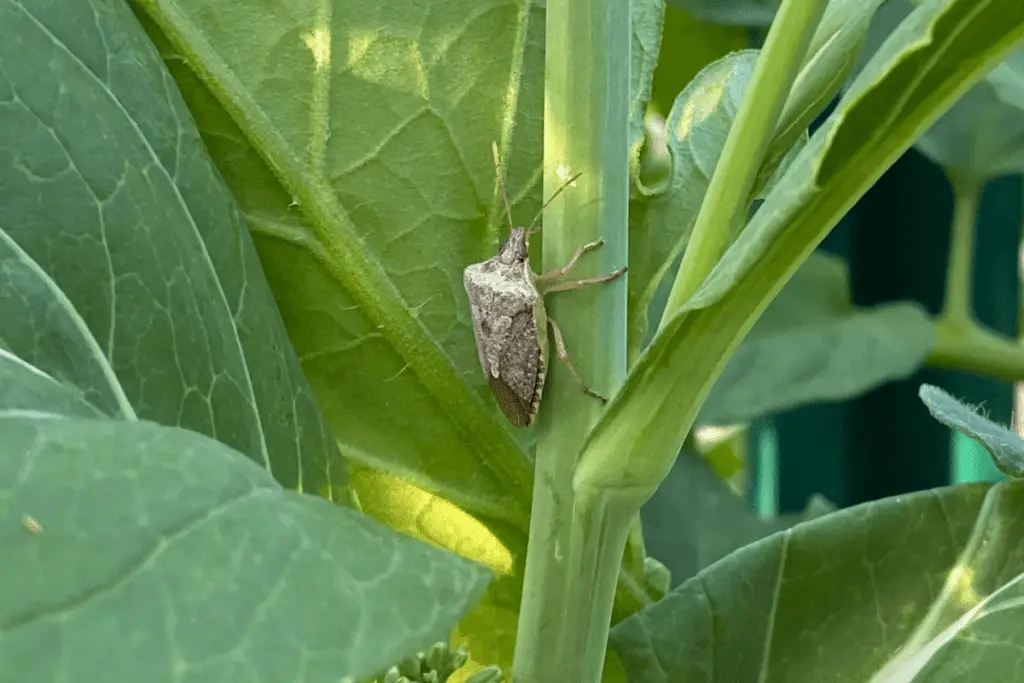
Aphids, caterpillars, and spider mites are three of the most common herb pests, but other nasty bugs—like cucumber beetles, leaf-footed bugs, squash bugs, and whiteflies—don’t seem to care very much for herbs.
Because herbs are unattractive to so many destructive pests, I’m much more hesitant to use neem oil on them than I am on eggplants, peppers, tomatoes, and other pest-attracting plants.
Related side note: After you’re done reading this article, I encourage you to check out my step-by-step guide to using neem oil on tomato plants.
2. Neem Oil Can Burn Wispy, Delicate Foliage
Neem oil is safe to use on all kinds of garden plants, but perhaps the most important reason for thinking twice before spraying neem oil on your herbs is that neem oil is capable of burning plants if applied at the wrong time of day, especially on hot, sunny days.
This is especially true of plants that have delicate leaves, like many herbs do.
Neem oil works by covering plant foliage in a thin layer of oil, which typically dries in 1-2 hours. When insects munch on or pierce the plants, they unwittingly ingest neem oil’s chemical compounds, including its primary chemical compound azadirachtin.
It takes 4-7 days for neem oil to begin working, but once azadirachtin is distributed throughout insects’ bodies, it begins causing all kinds of biological, hormonal, and developmental problems.
But neem oil can also cause problems for different kinds of plants, especially those that have wispy leaves, since it’ll coat them completely and thus increase the changes of plant burn, especially on warmer days.
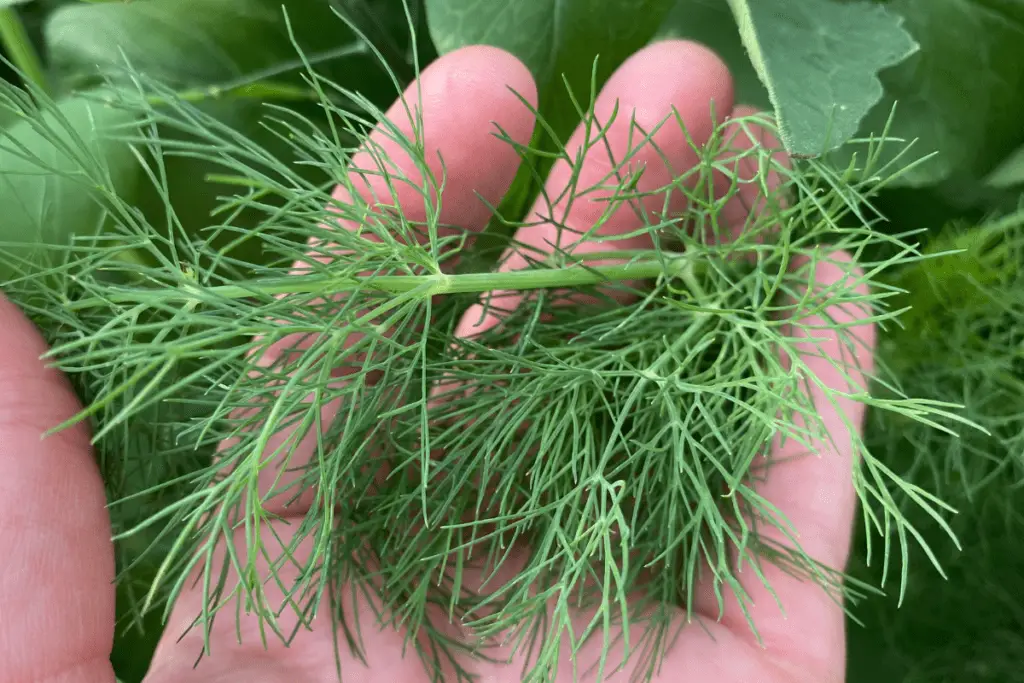
Hardier plants–like eggplants or tomatoes–can easily withstand minor or even moderate plant burns and continue producing new, healthy foliage to replace all that was burned.
Herbs are different. If you’re growing cilantro, dill, or parsley, for example, if you apply neem oil incorrectly–either using too much, applying it too often, or spraying at the wrong times of the day–you could easily damage not just a few leaves here and there but the entire plant because the stems and leaves are small and delicate.
3. Neem Oil Doesn’t Work Sometimes
Unfortunately, although neem oil can do wonders when it comes to pets management, there are times when it simply doesn’t seem to work. There are numerous reasons why neem oil doesn’t work at times, but here are a few of the more likely reasons:
- Your neem oil is past its prime and is thus no longer potent: Neem oil is good for 1-2 years, but as time goes on, the natural chemicals in neem oil begin to break down. If you purchase a bottle of neem oil that’s already been on the shelf for 6+ months, you’ll get 1 or possibly 2 seasons out of it before it grows less effective.
- Your neem oil wasn’t stored properly: If you store your neem oil in an outdoor shed, carport, or other detached structure, you’ll be exposing it to weather variations, and extreme cold or heat will cause neem oil’s chemical compounds to break down completely. It’s best to store neem oil in an indoor, climate-controlled environment to ensure it lasts as long as possible.
- Neem oil doesn’t work on some bugs: Although neem oil has been shown to harm over 200 bugs, there are some bugs that don’t seem too fazed by neem oil, such as leaf-footed bugs and squash bugs, among others. In such instances, neem oil won’t do much to deter or harm these bugs, and your garden plants will suffer additional damage.
4. Insecticidal Soap Is a Good Alternative
As I’ve explained in articles on how spider mites spread and how to help plants recover from spider mites, I like using neem oil as part of my pest management process, but I also love using a simple, homemade insecticidal soap spray as well, often in tandem with neem oil.
Insecticidal soap won’t harm or kill as many bugs as neem oil will because–unlike neem oil, which causes cellular degradation in a wide variety of bugs–soapy water sprays don’t cause any damage at the cellular level. These sprays instead coat bugs in a soapy watery film.
But insecticidal soap won’t burn your plants, and it’s highly effective against several garden pests that are known to damage herbs: aphids, Japanese beetles, and spider mites.
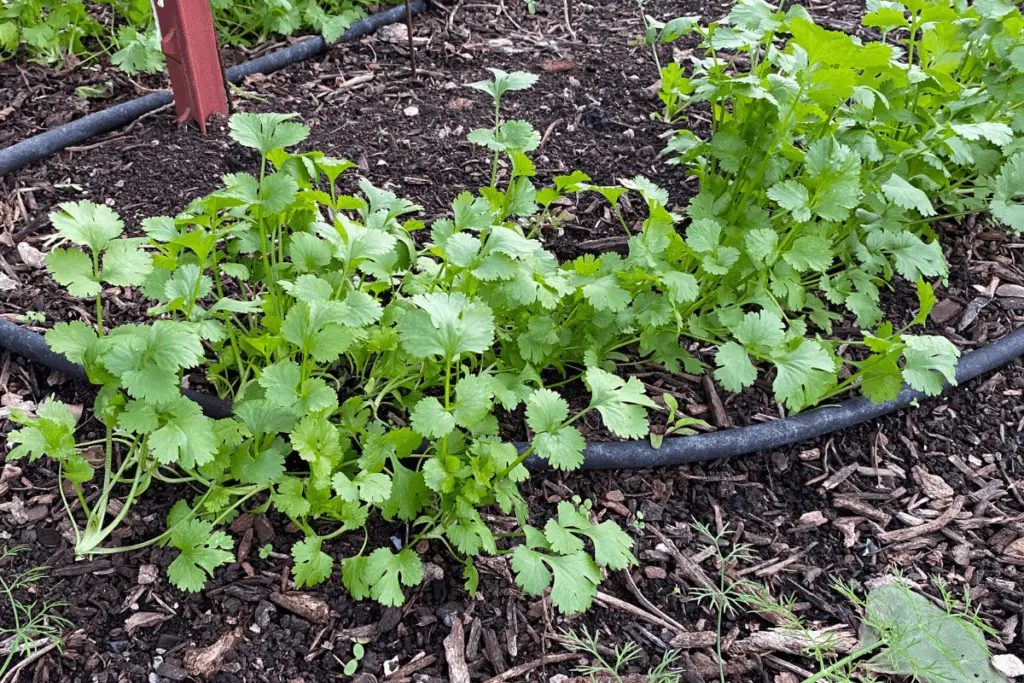
Here’s a step-by-step breakdown of how I make and use insecticidal soap:
- Check your herbs to see if there are any aphids, japanese beetles, or spider mites.
- Fill a 1-gallon or 2-gallon garden sprayer with water. See some recommended products above.
- Add 4-5 tablespoons of natural liquid soap per gallon. I prefer Dr. Bronner’s Peppermint Castile Soap over Dawn since the latter has grease-cutting chemicals in it that I don’t want in my garden. The 2-pack that I linked to above is a good deal in terms of cost per ounce.
- Shake well, then use the pump to pressurize the container.
- Spray plants thoroughly, making sure to get the undersides of any leaves. I’ve done so as often as once a day when faced with big infestations.
- Unlike neem oil, soapy water won’t break down. Store excess insecticidal soap and use whenever bugs reappear among your herbs.
Here’s one caveat to what I’ve written above: If you’re planning to grow parsley or dill this year, I suggest planting extra, preferably in a different part of your garden.
If you notice the appearance of caterpillars, check to determine if they’re black swallowtail caterpillars. If they are, relocate the caterpillars to the additional parsley plants and let them feast for as long as they need. Black swallowtail butterflies are helpful pollinators–who just so happen to love herbs–so you should take care not to harm or destroy the caterpillars if you notice them on your plants.
The good news about both neem oil and insecticidal soap is that they won’t harm beneficial pollinators or ladybugs alike, assuming you don’t spray them directly (because that will likely harm them). The same goes for earthworms, which is why neem oil is such a great product for pest management since it kills off many destructive bugs while leaving the helpful ones to do their work.
To recap what I’ve noted above, you can technically use neem oil on all of your herbs, but you run the risk of damaging delicate, wispy plants when you do so. For herbs, I recommend using the less potent but safer insecticidal soap, thus setting neem oil aside for the hardier plants in your garden.
If you’ve sprayed your herbs with neem oil, and you’re worried that they might get burned, there’s no harm in washing neem oil off your plants. I typically don’t do so, but I once unthinkingly sprayed my plants (including basil and parsley) with neem oil during the morning when the sun was out–which is a great way to burn or even kill them–so I quickly sprayed my plants with soapy water, then put the hose nozzle on a lighter setting and washed everything off.
Thankfully, my plants were fine, and I haven’t made that mistake again!
Does Neem Oil Affect the Taste of Herbs?
We know that neem oil makes plant foliage unappetizing to many bugs, sending them elsewhere to look for food. But what about us? Will neem oil change the taste of herbs?
When applied properly, preferably 5-7 days before a harvest, neem oil will not affect the taste of herbs, especially since exposure to sunlight will cause the chemical compounds in neem oil to break down quickly.
But care should be taken when applying neem oil shortly before a harvest. There are certain do’s and don’ts you’ll need to keep in mind, and you’ll want to make sure you wash your veggies thoroughly to remove any remaining neem oil.
If you wait several days to harvest or give your herbs a good washing prior to eating, you won’t notice any changes to the taste of your herbs.
What Plants Should You Not Use Neem Oil On?
I’ve compiled a list of plants you shouldn’t use neem oil on, but here’s a quick overview of my recommendations:
- Arugula
- Basil
- Carraway
- Chives
- Cilantro
- Dill
- Kale
- Lettuce
- Marjoram
- Oregano
- Parsley
- Pea
- Rue
- Sage
- Spinach
- Thyme
You can use neem oil on kale, lettuce, and spinach, but I’ve had mixed results. On a few occasions, everything went just fine. But I burned several plants once despite waiting until later in the day to spray, so when it comes to leafy greens, I prefer insecticidal soap over neem oil, especially when dealing with aphids.
Further Reading
If you’d like to learn more about herbs, neem oil, or insecticidal soap, I recommend checking out these articles:
